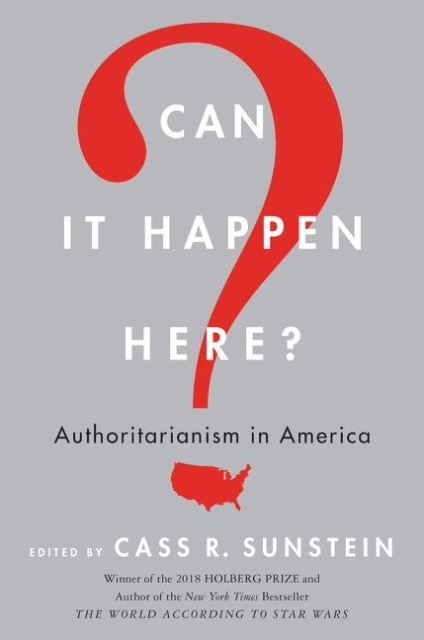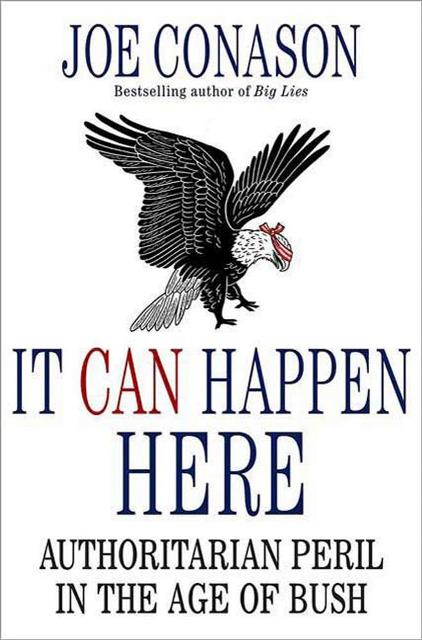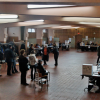Recent years have witnessed a deluge of commentary warning of imminent threats to democracy in the United States, the West, and the world. Here in the United States, this rhetoric became especially heated with the rise of Donald Trump. Commentators warned that “Trump is a threat to liberal democracy;” that the United States has “never been so ripe for tyranny;” and that “this is how fascism comes to America.” Academics too have suggested that democratic erosion is a “clear and present risk.”1Aziz Huq and Tom Ginsburg, “How to Lose a Constitutional Democracy,” (working paper, Public Law, University of Chicago, 2017), 6. Multiple surveys have been launched since Trump’s nomination (notably Bright Line Watch and the Authoritarian Warning Survey) to track scholars’ perceptions of the dangers that American democracy now faces. Books with titles like How Democracies Die2 New York: Crown, 2018More Info → and Can It Happen Here? Authoritarianism in America3
New York: Crown, 2018More Info → and Can It Happen Here? Authoritarianism in America3 New York: Dey Street Books, 2018More Info → have suddenly appeared at the top of national bestseller lists.
New York: Dey Street Books, 2018More Info → have suddenly appeared at the top of national bestseller lists.
Nor are these warnings unique to the United States. Marine Le Pen of France was similarly described as a “threat to democracy” during the French parliamentary elections of 2017, as was Geert Wilders of the Netherlands. The unexpected electoral success of the Alternative for Germany and the Five Star Movement in Italy provoked similar concerns. Hungary, Poland, and several Eastern European countries are already experiencing significant democratic decay.4Kim Lane Scheppele, “Not Your Father’s Authoritarianism: The Creation of the ‘Frankenstate,’” European Politics & Society: Newsletter of the European Politics and Society Section of the American Political Science Association Winter (2013): 5–9. Beyond the United States and Europe as well, many analysts agree that the danger signs for democracy are now “flashing red.”
But warnings of this sort are hardly new. Like Trump, former president Barack Obama was similarly accused of precipitating a “democracy in crisis,” and, more ominously, of threatening to “end America, the country we love, as we know it.” George W. Bush’s presidency inspired books warning that It Can Happen Here: Authoritarian Peril in the Age of Bush.5 New York: St. Martin’s Press, 2007More Info → Some have suggested that the current climate of alarmism is unwarranted, and that a more nuanced appraisal of the data reveals little evidence of democracy in decline. And even if alarmism is warranted, Trump and other right-wing populist leaders may not be the appropriate targets. Some caution that hysteria is the real danger to democracy, or that “leftist anarchy, not Trumpian fascism” is democracy’s most serious looming threat.
New York: St. Martin’s Press, 2007More Info → Some have suggested that the current climate of alarmism is unwarranted, and that a more nuanced appraisal of the data reveals little evidence of democracy in decline. And even if alarmism is warranted, Trump and other right-wing populist leaders may not be the appropriate targets. Some caution that hysteria is the real danger to democracy, or that “leftist anarchy, not Trumpian fascism” is democracy’s most serious looming threat.
For students in universities around the country, this cacophony can be extremely disorienting. Is American democracy really under threat? What about democracy in the West, or the world more generally? If it is under threat, what can we do about it? And if it is not, why are we all so worried that it is? To help students answer these questions, I am currently coordinating a multiuniversity collaborative course on democratic erosion across nearly two dozen campuses in the United States (and one in the Philippines). The course began as a standalone seminar at Brown University, where I am an assistant professor of political science and international and public affairs, but quickly expanded to other campuses through word of mouth, various email listservs, and a blog post that I wrote with my colleague Jeff Colgan encouraging other professors to join in. We have benefitted as well from local and national media coverage in the Washington Post Magazine and Rhode Island’s NPR station.
“Our goal is to treat the threat of democratic erosion as an empirical question, rather than merely a political one.”The Democratic Erosion project was born of a shared desire to better understand our unique political moment; to contribute to efforts to safeguard American democracy from whatever threats it may currently face; and to encourage students (and faculty) to critically evaluate the risks to democracy both here and abroad, not through the filter of partisan attachments, but rather through the lens of theory, history, and social science. Importantly, the project is not intended as a critique of Trump, or of any other American politician or political party. Our goal is to treat the threat of democratic erosion as an empirical question, rather than merely a political one.
Faculty at 19 universities are currently participating in the collaboration;6American University; Boston University; Brown University; Columbia University; Georgia State University; Indiana University Bloomington; Ohio State University; Skidmore College; Stanford University; Texas A&M University; University of California, Los Angeles; University of California, Davis; University of Denver; University of Memphis; University of North Carolina, Chapel Hill; University of Pennsylvania; University of the Philippines, Diliman; University of Virginia; and Yale University. more will join this coming fall. We developed the syllabus and lesson plans collaboratively, and devised assignments to maximize opportunities for cross-university dialogue. In lieu of final papers, students wrote country case studies that were then used as raw data for a meta-analysis on the causes and consequences of democratic erosion, which students at Texas A&M presented to USAID’s Democracy, Human Rights, and Governance (DRG) section, the US State Department, and a consortium of NGOs in May. And in lieu of essays or reading responses, students wrote posts for our publicly accessible blog. Each post used readings from the course to illuminate some recent or current event in the United States or elsewhere. In most iterations of the course, students were also required to attend a political event of their choosing (a pro- or anti-Trump rally, for example) and write a blog post reflecting on their experience, which was then shared with all participating universities to allow for comparisons across settings.
In collaboration with the Social Science Research Council’s Anxieties of Democracy program and the SSRC’s essay forum, Items, at the end of the 2017–18 academic year we held a contest in which faculty at all participating universities nominated the best blog posts for publication as part of Items’ Democracy Papers section. This was an extraordinary opportunity for our students: the Democracy Papers feature some of the leading luminaries of political science, several of whom feature prominently on our shared syllabus. The short list that our faculty produced included 20 posts from seven universities covering a wide variety of topics, from freedom of the press in Pakistan to surveillance technology in Namibia, and from upheaval within the party system in Western Europe to the proliferation of partisan gerrymandering here in the United States.
From this short list, the SSRC team then picked four winners to spend the summer polishing and expanding their posts for publication: Sarah Stradling from the Ohio State University, Danielle Trujillo from the University of Denver, Victoria Potts from the University of Memphis, and Rachel Risoleo from Brown University. The four essays that these young scholars produced are a testament to the breadth and sophistication of our students’ work, and to the spirit of incisive political inquiry that lies at the heart of our collaboration. As faculty, it is deeply rewarding to see our students’ work showcased alongside essays by Jan-Werner Müller, Katherine J. Cramer, Larry M. Bartels, and other prominent scholars in our field. We are very grateful to the SSRC for its support and enthusiasm, and we look forward to continuing our collaboration in the future.













